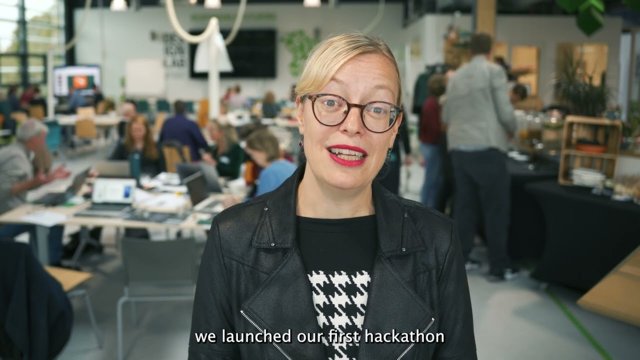THE HACKATHON ON ARTIFICIAL INTELLIGENCE IN EDUCATION
Which AI solution is able to solve problems in education? This was the question on 8, 9 & 10 November 2023 for 11 teams during the Hackathon AI in education. This is the second year that we organized a Hackaton AI, which is initiated by the #AIDE network.
We invited all the teams, to attend to our keynotes on 8 & 9 November and to work on their inspiring cases at the DesignLab University of Twente with the help of JEDI’s. These where the participating teams and the cases they worked on:
- CITO - a tool to solve very relevant problem of a lack of AI literacy for students.
- Saxion team 1 - a Study Coach E-tool
- Saxion team 2 - 24/7 personal and empathic study coach
- Amsterdam UMC team 1 - creating an AI patients simulator.
- Amsterdam UMC team 2 - providing formative feedback on theses of bachelor of medicine students using AI.
- Wageningen University & Research - grading formulas in Brightspace. The idea is to use AI as a teaching assistant with these formulas.
- Infotopics - creating an AI assistant for teachers based on qualitative and quantitative actionable data (not only cognition, but also social behavioral data), to provide them with in depth insight on individual students.
- Rijn IJssel - a tool to predict the dropout in mbo.
- Onderwijsregio -a support tool for the selection of future teachers
- HAN - tool for padeltrainers to give feedback to their students, based on motion tracking
- University of Twente & University of Bremen - feedback on instructional videos.
On Friday 10 November, the teams presented their ideas parallel to two knowledgeable jury’s: Bernard Veldkamp (UT-BMS), Jan Jaap Vroom (MBO raad), Tjeerd Hans Terpstra (CITO), Bertine van Deyzen (SURF), Bram Enning (Npuls) and Esther Ventura-Medina (Technische Universiteit Eindhoven).
After thorough jury deliberation, the two winners were announced.
The first winning team: University Twente & University of Bremen. They worked on automated feedback on instructional videos. In teacher training, for example students often have to hand in videos explaining a certain topic to their students. Teacher trainers need to watch all these videos and provide feedback, for example on the use of multimodal principles and the quality of instruction. They were able to develop a proof of concept with the help of #ChatGPT4 and ended up with a tool that worked.
The second winners where one the two participating teams of Saxion. They put the motto of Saxion ‘Get ready for a smart world' in shape with their AI tool sAxI: a 24/7 personal and empathic study coach to help Saxion students find specific answers to their specific questions, based on open data from Saxion in a Large Language Model (LLM).
We want to congratulate the winners once again and thank all the participants for the great energy, effort, and collaboration! Hope to see you in a new edition of the HAckaton AI by the #AIDE network!
This Hackaton is organised by: University of Twente, in association with AID-E network, DSI (sponsor) ,CEE (sponsor), LISA, Pre-U, Pro-U, TELT, DesignLab, vakgroep CODE & vakgroep ELAN
KEYNOTES
What is a hackathon?
A hackathon is an activity in which participants work non-stop on a specific case within a short period of time. Prior knowledge of Artificial Intelligence is preferred but not required to participate; there are experts (Jedi's) available to support the participating teams. Additionally, all participants are asked to undergo online professional development prior to the event.
We invited teachers, school leaders, managers, students, learners, and other interested individuals to form teams of 6-8 people and work on a problem in education for three days (November 8th, 9th, and 10th, 2023). Guided by the Jedi, the teams developed their own AI application for the chosen case. On November 10th, all teams presented their solutions to an expert jury, who evaluated the presentations and ultimately select the winner(s).
AFTERMOVIE 2023
Bekijk onderstaande aftermovie!
KEYNOTES
Want to know more about AI?
"The term 'Artificial Intelligence' (AI) was introduced in 1956 by scientist John McCarthy. He defined AI as 'the science and engineering of creating intelligent machines.' In our society, there is an increasing availability of data. This data, combined with the growing computational power of computers and academic breakthroughs, has led to significant advancements in the field of AI. With the help of AI, we can discover patterns in large amounts of data that mimic human thinking and rational reasoning. This includes the ability to generalize, argue, interpret, and learn from the past.
AI also offers many possibilities for education. It can be used in scheduling, service processes, improving equal opportunities, enhancing knowledge assessment, facilitating location- and time-independent (lifelong) learning, and ensuring quality.
Want to learn more about Artificial Intelligence? Take a look at this article:
ORGanisers
The Hackathon is organized by the University of Twente in collaboration with AID-E network, CELT, LISA, Pre-U, Pro-U, TELT, vakgroep CODE & vakgroep ELAN. Special thanks to our sponsors CEE and DSI for their generous support! CEE & DSI!





